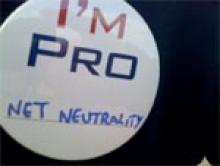FCC on Net Neutrality: More Bush than Obama
Whenever the discussion of Network Neutrality comes up, we like to remind everyone that when the network is locally owned and accountable to the community, anti-subscriber discrimination is not a problem. That said, we are strong supporters of proper safeguards to ensure massive companies like AT&T cannot abuse their market power and discourage innovation.
As the FCC prepares to discuss a half measure to preserve parts of the open Internet, a number of us have been frustrated that while we cannot read the proposal, AT&T appears to be helping write it. Karl Bode's take:
[T]he question shouldn't be whether or not consumers can now view a neutrality proposal after it was hashed out in private meetings (predominately with only the largest, wealthiest carriers), it should be: why weren't consumers absolutely integral in crafting it? AT&T has met with the FCC half a dozen times in the course of three weeks and likely knows precisely what's in this plan -- do you?We've written to FCC Commissioners to make it clear that they must not compromise on the future of the open Internet. You should too. Photo used under Creative Commons license from AdamWillis.




